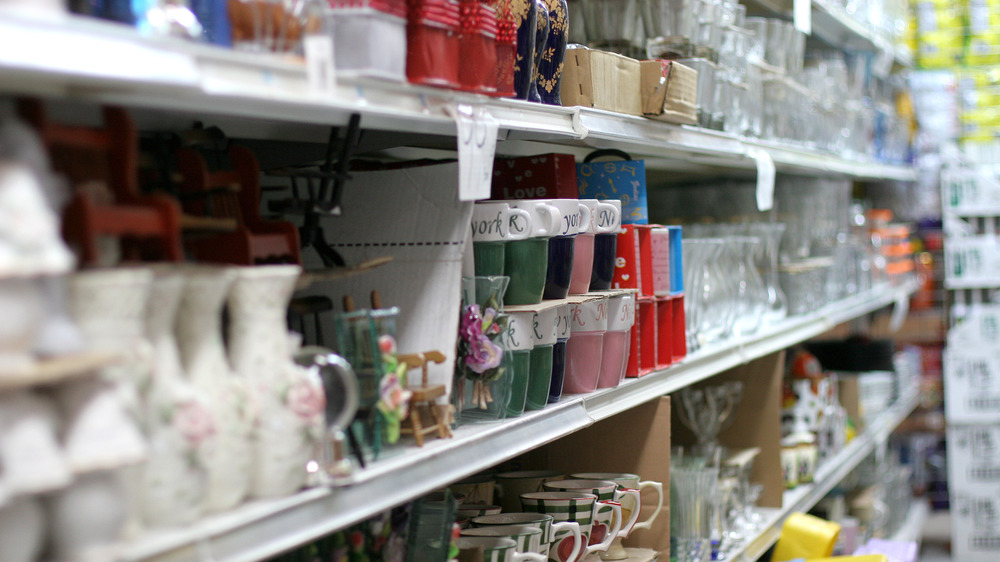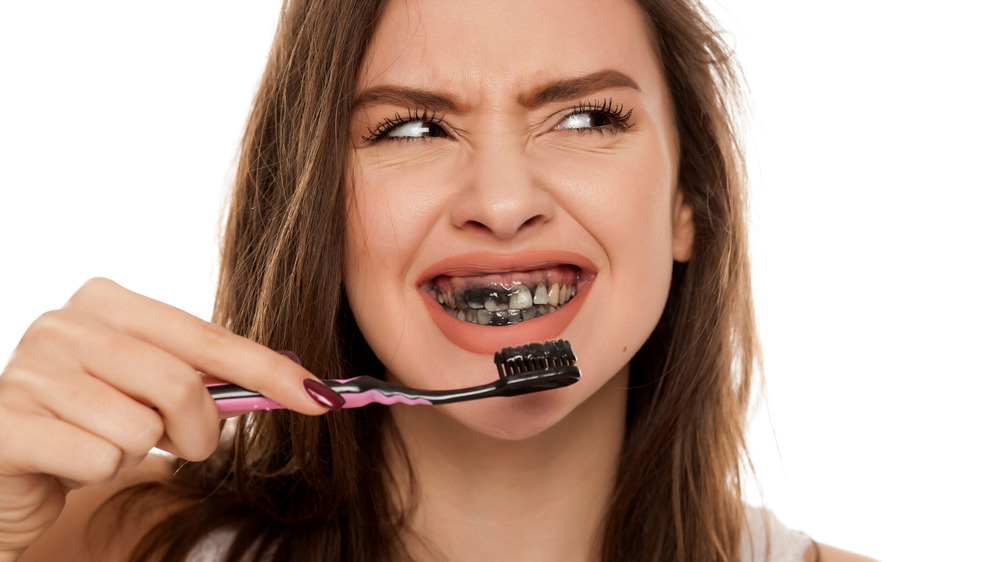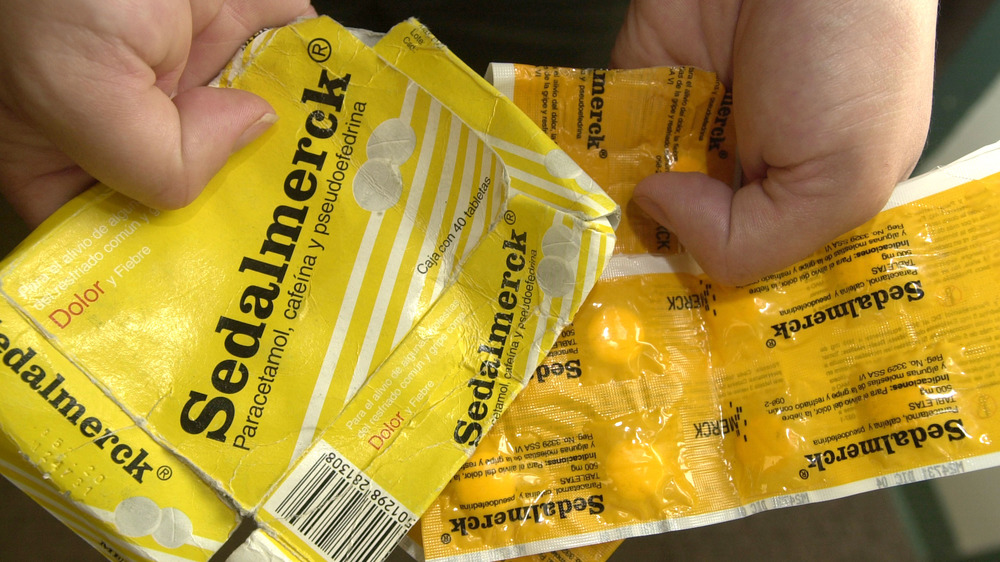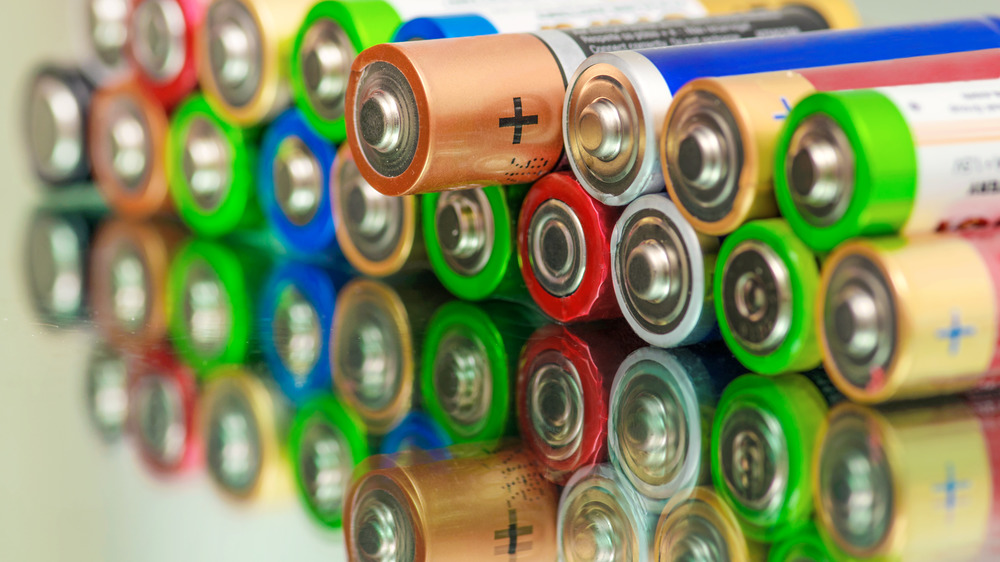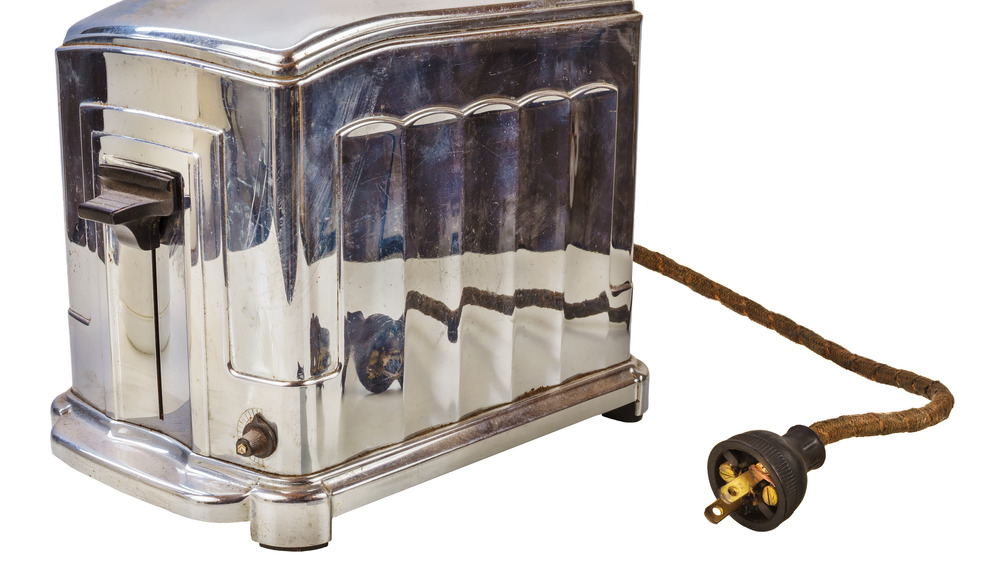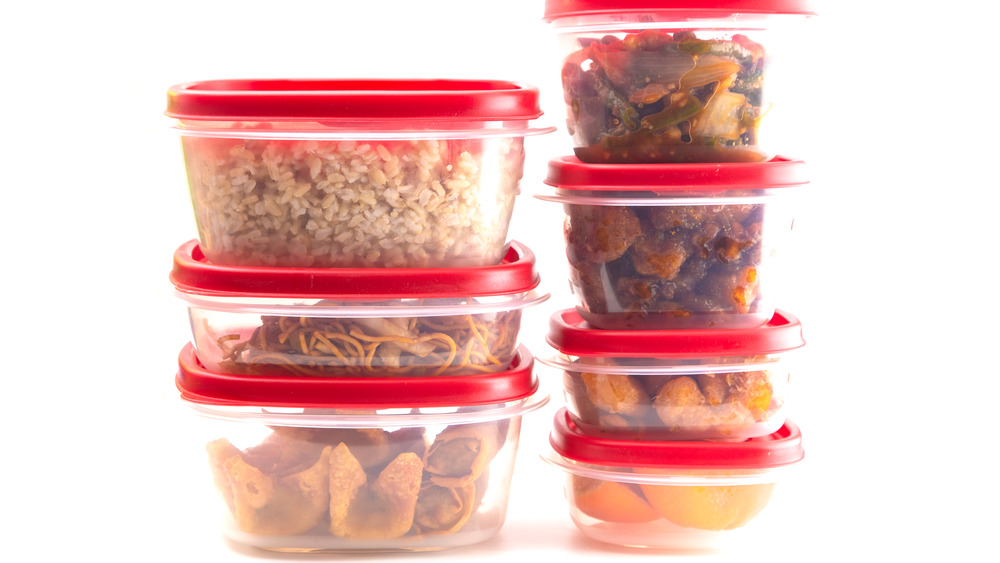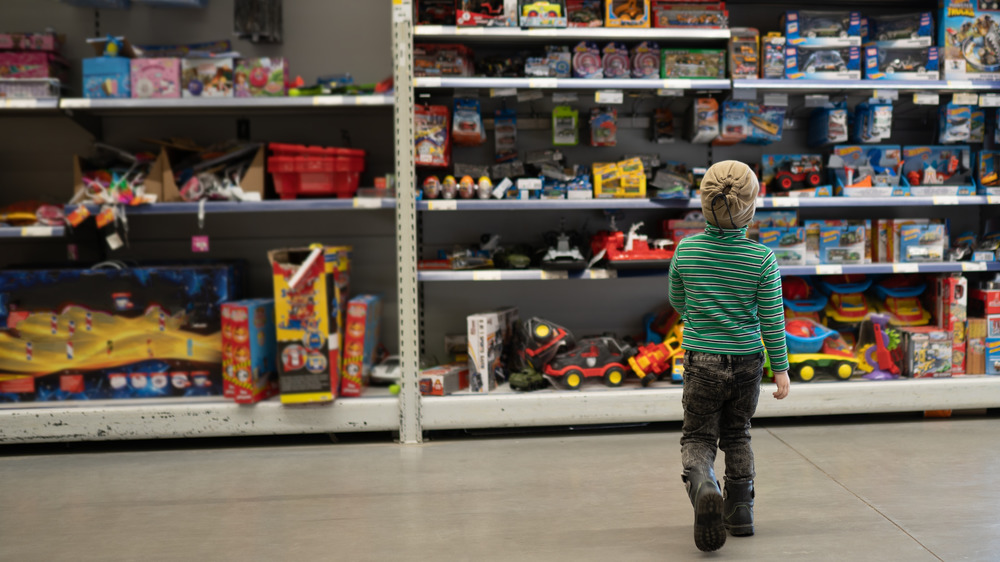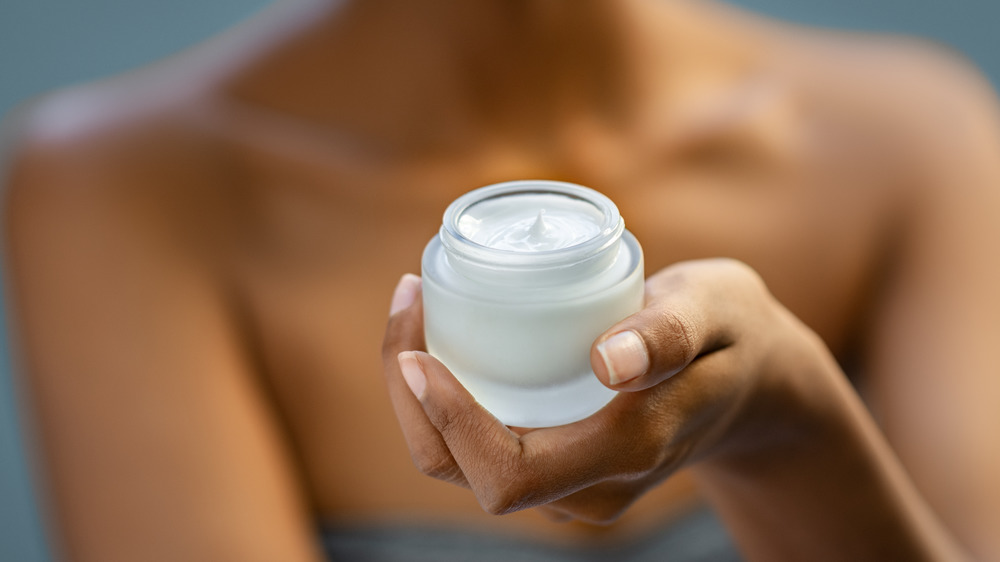Dollar Store Purchases That Might Be Dangerous
There's a lot to love about dollar store shopping. First and foremost, there's the cheaper prices on a variety of items, including cleaning products, office supplies, clothing, and cosmetics. And you can rely on those prices no matter what the economy is doing (albeit with a few exceptions, but here's why some things at dollar stores cost more than a dollar). Now, add to that the fact that dollar stores are everywhere. Dollar General, for example, had 16,278 U.S. locations in 2019. And part of the dollar store business model is to open up exactly where they seem to be most needed, which is to say, neighborhoods where incomes tend to be low and few other shopping options exist — that's actually one of the reasons dollar stores make so much money. But therein lies the rub.
"'Cheap'" sums up dollar store prices in more ways than one," Vipin Porwal, founder of the Smarty shopping app and consumer expert, told Mashed. According to Porwal, dollar store prices are also low because many of their items are made with cheaper materials and then private labeled.
In addition, some dollar store inventory is made of other stores' stock liquidations, which sometimes means expired foods and over-the-counter drugs, items that may have been subject to recall, and merchandise that is simply of poor quality (via Washington Post). In fact, some dollar store purchases might even be dangerous. Here are some dollar store purchases you'd best be careful before purchasing.
It could be dangerous to buy off-brand toothpaste at a dollar store
ABC 7 New York reported in 2009 that some dollar stores have sold toothpaste tainted with chemicals toxins, including the toxic chemical diethylene glycol, which can be poisonous. In addition, Snopes has reported that some of the toothpaste sold at dollar stores is not only not approved by the American Dental Association (ADA) but may also not even be in compliance with ADA standards.
In some cases, the problematic tubes are sourced from other countries where toothpaste standards don't measure up to those of the ADA, including China, South Africa, and Kenya, according to Snopes. On the other hand, some dollar store toothpastes are way past their expiration dates, which doesn't pose a "danger," per se, but may make the toothpaste less pleasant to use or less effective when used. That's why it's important to carefully read the label before purchasing toothpaste at a dollar store, or as Snopes puts it, "Something that looks like a bargain may really be less than it appears, so shop wisely."
Buying over-the-counter drugs at a dollar store could pose a danger to you and your family
One of the items you can consider purchasing at a dollar store is over-the-counter drugs, but only in circumstances where you are familiar with the brand and are certain said brand is reputable. Otherwise, you could be courting danger. That's because some dollar stores have been known to stock over-the-counter medications produced outside of the U.S. by manufacturers that have been cited for violating food and drug laws, according to the U.S. Food and Drug Administration (FDA).
Given that generic drugs are supposed to be vetted by the FDA before making their way to retail stores, such things should never happen, but, as evidenced by a 2019 warning letter the FDA sent to Dollar Tree, they still do. That letter outlined multiple violations of U.S. manufacturing standards by drug manufacturers supplying over-the-counter medications sold at Dollar Tree and Family Dollar stores.
But even once you've determined a brand is safe, you should still check to be sure the expiration date on the product has not passed. Dollar stores are notorious for putting and/or keeping expired products, including over-the-counter-drugs, on their sales floors. For example, in 2019, Dollar General, Dollar Tree, and Family Dollar were all found to be selling expired over-the-counter drugs, according to New York Attorney General Letitia James. And by the way, this is not the only way dollar stores could be harmful to the communities they are trying to serve.
Dollar store-branded vitamins and supplements might also be dangerous
One of the sneaky ways dollar stores might try to scam you is by selling private-label vitamins. In 2009, Consumer Reports once reported that its quality testing of dollar-store multivitamins revealed many failed to meet their label claims for certain nutrients, and many also didn't dissolve properly. Three years later, the consumer watchdog noted that it still did not recommend buying off-brand multivitamins or any other off-brand vitamins, for that matter, from dollar stores.
Although the U.S. FDA has stringent laws regarding the labeling of supplements, the fact is that supplements are not held to the same standards as FDA-approved drugs, and, as Harvard's Women's Health Watch put it, evidence indicates that few are effective, many are useless, and others may be harmful, delivering substantially more of a particular nutrient than what your own doctor might consider safe. In other words, any supplement you may purchase from anywhere may not be safe or worth the money, but when you purchase it at a dollar store, you're taking your chances even further.
Dollar store foods are cheap, but are they safe enough to be worth it?
There are reasons why dollar store food is so cheap, and some of these are perfectly benign, including lower operating costs than many grocery stores or selling a lot of private label foods. But others could make you think twice about buying groceries at a dollar store. In addition to foods you should never buy there because they probably aren't the bargain you think they are or because they simply taste bad, there are some foods that could be downright dangerous to purchase at dollar stores.
One of those is canned foods from dented cans. Dented cans can contain something called "clostridium botulinum," and if that sounds familiar, it's because this is the bacteria that causes botulism, which the FDA calls "a severe form of food poisoning." It's a rare bacteria, but Consumer Reports advises that it can still be deadly, "so don't take any chances."
You'll also want to check the expiration date on any food you purchase at a dollar store, because dollar stores can and do sell expired foods. In some states, the practice isn't even illegal, WFMY News 2 in Greensboro, North Carolina reports.
As smart shopping expert Trae Bodge of True Trae told Mashed, it's wise to take care when food shopping at dollar stores with both "perishable and packaged foods, including candy and drinks." According to Bodge, "freshness and quality can be questionable," so it's best to "proceed with caution."
Use caution when buying hand sanitizer at a dollar store
The hand sanitizer business has exploded as a result of the novel coronavirus pandemic, but not all hand sanitizers are created equal. And some, including those sold in dollar stores, may be downright dangerous, according to the FDA.
As an ordinary consumer, you may not know that hand sanitizers are considered over-the-counter drugs subject to FDA regulation. In other words, they have to meet certain standards set by the government body. To meet those standards, hand sanitizers must, among other things, be sold with a "Drug Facts" label that includes ingredients and all appropriate warnings, particularly with regard to exposure to children. So, your first order of business when purchasing hand sanitizer from a dollar store is making sure that what you're purchasing has such a label. If it doesn't, it's a pretty good indication that the manufacturer is willing to cut corners to save money.
But just because a hand sanitizer has such a label doesn't mean the facts on the label are true. In fact, Dollar Tree and Family Dollar had been selling a number of hand sanitizers that were later recalled by the FDA for containing undeclared toxic chemicals, including methanol (via Dollar Tree), exposure to which can result in serious health effects or even death, with young children being most at risk, the FDA reports. And some of these stores may have continued to sell such hand sanitizers even after they were recalled.
Dollar store batteries are cheap, but that could come at a price
Despite that rechargeable batteries are becoming increasingly popular and more reliable, disposable batteries are still useful for many battery-operated consumer products, especially those that use less power, like TV remotes, The New York Times reports. But that doesn't necessarily mean that any old battery can do, and this could be especially true when it comes to dollar store batteries.
Firstly, value-brand dollar store batteries could actually leak and damage your devices, according to consumer expert Andrea Woroch, via GOBankingRates. And according to Consumer Reports, not only are there differences in the amount of energy in name-brand versus value-brand batteries, a Southeastern Louisiana University researcher also found that, more specifically, dollar store batteries are sold with less stored energy than name-brand batteries.
Battery power might not matter when you're shopping for bulk quantities of batteries for toys and TV remotes, but it could matter a lot if the batteries you're shopping for are intended for more important items, including medical devices or a flashlight that you keep by the bed just in case there's a power outage. As shopping expert Trae Bodge advised Mashed, when it comes to dollar store shopping it's probably best to "skip batteries unless they are a known brand, like Energizer or Duracell."
Anything that has an electrical cord could be a risky purchase at a dollar store
Sure, 1997 is a while ago now, but anyone who bought one of those adapter plugs that were recalled by Dollar Tree that year for potential fire and shock hazards might still be wary of buying basically anything involving an electrical plug from a dollar. And you should be too, according to The Washington Post, which in 2019 pointed out that anything with an electrical cord that is off-brand is a risky purchase, particularly power strips and chargers, which are likely to be cheaply made and could damage whatever you plug into them.
Consumer expert Andrea Woroch apparently agrees, but based on a slightly different risk factor. In 2017 she told GOBankingRates that some extension cords and USB cables from dollar stores have tested high in chlorine, indicating they contain polyvinyl chloride plastic, commonly known as PVC, which research suggests is a known carcinogenic.
Bottom line? "You'll find plenty of power cords, headphones, and other tech accessories at the dollar store. The price will be appealing, but there's no knowing if these are quality products, and my guess is that they are not," shopping expert Trae Bodge told Mashed.
Dollar store cooking knives can be dangerous in the most counterintuitive way
You might think that the sharper the knife, the more dangerous it can be. However, that's simply not the case. The reality is that the duller the knife, the more pressure one needs to exert in order to cut through something, meaning that if you cut yourself with a dull knife, you'll probably be doing it with greater force. One of the problems with cooking knives from most dollar stores is that their blades tend to be dull, according to Bobvila.com, the popular TV handyman's website, which also states that dull knives can lead to "dangerous cooking accidents."
In addition, a cheaply made knife is more likely to break while you're using it, according to All About Kitchen Knives, and whether it's a matter of the handle breaking off or the actual blade breaking, you could end up getting injured. Since, for the most part, dollar stores can sell cheaply whatthey obtain cheaply, there's a good chance any knife you buy at a dollar store will be cheaply made.
You probably want to avoid buying plastic food containers at the dollar store
Saving tonight's leftovers for tomorrow's dinner sounds like a perfectly fine idea, but it might depend on what you're storing tonight's leftovers in. If you're using plastic food containers, you could be exposing yourself to BPA, a chemical used to harden plastic.
The FDA currently allows manufacturers of plastic food containers and other plastic products that come into contact with food to use BPA in the manufacturing process. However, many consumers have been and remain wary of BPA, according to an FDA report. Also, Consumer Reports reported in 2019 that some studies actually link BPA to various health issues, including infertility and certain cancers, and that a recent study indicates that the way the FDA and others have been measuring BPA could be vastly understating how much BPA is present in everyday products.
Manufacturers are creating more and more BPA-free products, however, according to Mayo Clinic, which recommends seeking those products out. If you can find BPA-free plastic food containers at your local dollar store, then you might feel a bit better about bringing them home. The good news is that in 2019, Dollar Tree pledged to phase out BPA and several other toxic chemicals that are present in a number of items sold at Dollar Tree and Family Dollar. The bad news is that as of January 2021, there was no news on Dollar Tree's progress in this regard.
Dollar store toys can be both disappointing and dangerous
Many shopping experts steer consumers away from purchasing toys at the dollar store: "I wouldn't purchase toys at the dollar store. The quality is never there and could be potentially harmful if the toy breaks and sharp edges are exposed," shopping expert Trae Bodge told Mashed. And of dollar store toys, the The Washington Post put it this way: "[Most] break easily, may have small parts that can pose a choking hazard, and don't last."
In addition, the Washington Post pointed out that some dollar stores don't ever receive notifications of toy recalls. And recalls of dollar store toys do happen: In early 2016, Dollar General had to recall about 27,000 toy construction trucks that were sold exclusively by their stores. The reason? The remote control for the trucks was prone to short circuiting, which can cause overheating, fire, and burn hazards, according to the Consumer Product Safety Commission.
And there may be more than just accidents and injuries to think about. In 2015, environmental safety groups HealthyStuff and Campaign for Healthier Solutions tested 164 dollar store items, including toys, for known toxins and found that 81 percent contained at least one hazardous chemical at a level that should be concerning, Ann Arbor, Michigan-based environmental group Ecology Center reports.
Remember that everything you buy for a baby will end up in their mouth at some point — especially with stuff from dollar stores
Babies are at higher risk than adults when it comes to exposure to environmental toxins for a number of reasons, including simply by virtue of their smaller size, according to a 2020 research in the journal Pediatric Annals. Medical experts like those at Kids Health encourage parents and caregivers to select baby clothing and accessories with an eye on safety, including ensuring that only non-toxic materials be permitted to come into contact with baby (among other things that are important to know before having a baby).
Now, if you take a look at the baby apparel and accessories page of Dollar General's website, one of the first things you will notice is that few, if any, items of merchandise are from recognizable brand names. Maybe the absence of a brand name on a roll of paper towels wouldn't worry you, but when it comes to items your baby might put in their mouth, it can go a long way toward assuring you that said items are made of non-toxic materials and otherwise pose no health or safety hazards to your baby. In the absence of a brand name, such assurance is hard to come by.
Be on the lookout for skincare products sold at dollar stores that contain this harmful chemical
"Whatever your complexion, it's important to use products that will help your skin and not damage it," the FDA wrote in 2016. "But as you wade through the beauty aisles, the U.S. Food and Drug Administration cautions that you should avoid skin creams, beauty and antiseptic soaps, and lotions that contain mercury."
Mercury is extremely toxic, according to the World Health Organization (WHO), not just to those who ingest it or rub it on their faces, but to anyone who might be close enough to breath in its vapor or touch a washcloth contaminated with it. "It could be as simple as touching someone's cheek or face," according to FDA medical advisor Arthur Simone, MD. And mercury could also be passed through breast milk to a nursing baby.
If you hadn't guessed, the FDA bans the use of mercury in skincare products, but James Humbert of the FDA's Office of Regulatory Affairs pointed out that plenty of mercury-contaminated skincare products, which are usually marketed as skin lighteners and dark-spot removers, make their way from foreign manufacturers into retail stores in the U.S., particularly, as the FDA noted, those that cater to Latino, Asian, African, or Middle Eastern communities. In other words, dollar stores (via Fast Company).
Beware of expired sunscreen at dollar stores
"Skincare products need to be fresh in order to be effective," according to shopping expert Trae Bodge. The problem, as Bodge explained to Mashed, is that a dollar stores get some of their inventory from overstock liquidations, and that includes some skincare products. Since it's hard to know how old a particular skincare product bought from overstock liquidations might be, Bodge says she would "question" whether skincare products on dollar store shelves are worth buying, especially when it comes to sun protection.
The risk associated with using some skincare products past the point where they're still "fresh" is that the product may not be effective, according to Bodge. "Where it becomes dangerous, however is with sunscreen products since SPF degrades over time. If you're using an SPF product that is past its prime, you may expose yourself to the sun, thinking you're protected when you're not."
